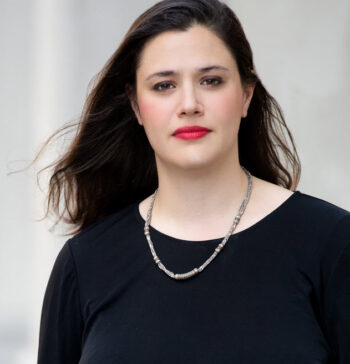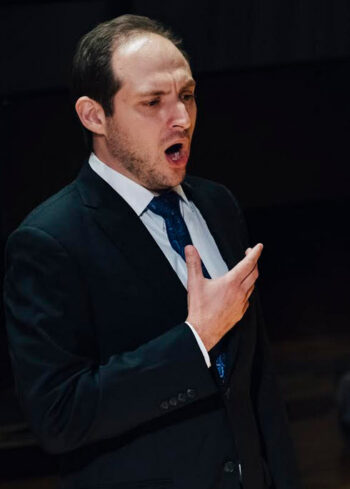by EMA Staff
Published March 27, 2023
Two singers respond to Christopher Lowrey’s “Let’s Talk about the English Choral Tradition”
Genevieve McGahey initially published a response to “Let’s Talk about the English Choral Tradition” on her blog, which she titled “Oh goodie! Another take on soprano straight tone in choral singing from a male conductor.”
By Genevieve McGahey
I have some trepidation wading into this particular fray, but here we are. EMA’s decision to publish an irresponsible take on female voices in choral music with no companion perspective from a trained soprano or pedagogue is extremely disheartening. As someone who has come through vocal injury as a young person and dealt with the attendant psychological and physical challenges, I am disappointed to see this narrative dropped so casually in front of so many.

In a recent article published in Early Music America, countertenor and conductor Christopher Lowrey provides an array of thoughts on the question of misogyny in the Anglican choral tradition. Feel free to read the article on your own time. Contrary to what he seems to suggest, there is significant misogyny baked into the Anglican choral tradition, and we are only now beginning to discuss it in the open.
Under the category of unexamined privilege, it is easy for Lowrey as a countertenor to state that higher-voiced sopranos should simply be aware that once they are no longer “young voices” or have a “supple” sound (dog whistle for “small” or “unobtrusive”) they must be prepared that their choral singing career will be over. Unfortunately, this kind of rhetoric remains common and is, frankly, a victim-blaming logic.
What goes unmentioned in this article is that a large number of choral conductors operating in both the volunteer and professional spheres have next to no knowledge of vocal technique and are often unwilling to admit to this gap in their education, let alone seek out resources to help them bridge it. Or, perhaps they know their own voice, but if they grew up singing tenor or bass, they are unlikely to understand what the soprano voice is capable of and how best to support it at different stages of development. As a result, they often end up perpetuating harm.
Not only that, but the model of attrition (use up a young voice, replace them with another one) that Lowrey’s argument implies should be used in “traditional” choral music (whatever that means) is not only misogynist in this context but foolish: you end up losing a great deal of musicianship and collective knowledge in the field.
Representation matters: what are we saying to young women and women-identifying folk when respected members of the field are given a platform to perpetuate a false narrative that women lose their value as musicians when they reach a certain age?
It becomes next to impossible to build trusting relationships between singers and conductors when you essentially commit to hiring a constant merry-go-round of young voices. That lack of trust not only affects the sound and the level of performance an ensemble is able to achieve (or, in many cases, not achieve), it also perpetuates many of the abusive power dynamics that we have seen go largely unchecked for years in the classical music and choral world specifically.
On a personal note: if I had followed the logic of Lowrey’s argument, I would have likely stopped singing at age 17 when I developed vocal nodes after years singing in an Anglican girls choir. I would have never discovered that I could learn to sing a high C with a variety of different tones and expressive qualities, none of them straight.
Perhaps this is also my string player training talking, but I must say, yet again, that sound is created by vibration. Asking sopranos to deny a law of physics and refusing to engage in a clear conversation around aesthetic preferences that admits to this fundamental truth, akin to the law of gravity, continues to be frustrating.
And finally: how many talented singers are we losing who encounter vocal fatigue or injury and assume that it is their fault? And that the road ends there? Lowrey implying that experiencing vocal fatigue equates to a lack of natural talent rather than framing it as a normal challenge that everyone will experience at different points of their career encourages the maintenance of the current veil of silence around vocal injury. We must encourage singers to seek help, be vulnerable, and understand that vocal challenges can be worked through.
I am very fortunate that I have encountered supportive teachers, conductors, and soprano role models who helped me to see a path forward. I have thoughts on (and would love to see more discussion) on the concrete pedagogy of helping “larger,” more resonant voices sing healthily and contribute in a choral context as well as what self-proclaimed choral specialists can learn from more traditional bel canto singing technique: that is a topic for a different day.
All I will say here is that having experienced and sought out training in both traditions has made me the musician I am today, and I consistently draw on both. I am also thrilled to report that, at age 32, my technique and abilities feel more solid than ever. So much for an early expiration date.
One thing I do agree with Lowrey on: this issue is under-discussed.
In my experience, many singing teachers are discouraged from engaging in frank conversations around technical modifications that singers can employ to make a healthy sound that prioritizes tuning and blend in a choral context. As someone with a naturally larger voice who has made most of my music career singing professional choral music, I am, according to Lowrey’s view, an oxymoron and shouldn’t exist. The fact that I do, and that I regularly encounter other talented, larger soprano voices who are able to sing healthily for conductors who respect physical limits and listen to their singers, gives me hope.
I’d like to close by once again bringing up the question of repertoire, as many have done and continue to do: why, if we are admitting to an argument that repertoire in the “traditional” canon does not allow for more female singers to comfortably participate in the choral music world into their older years, are we not looking to modify what is being written?
At the very least, why can we not look for and provide more options that respond to the realities of the aging voice? This sounds like a programming challenge for those who are brave and would like to encourage inclusivity rather than continue to push people out. I encourage us all to pay attention and give support to the groups that are already taking up that challenge.
Soprano Genevieve McGahey is a performer, concert producer, and scholar and has appeared across the United States and Europe. She earned her master’s degree in vocal performance and pedagogy from Westminster Choir College and has spent over 20 years engaging with Anglican choral music, including as a girl chorister at Washington National Cathedral.
++++ ++++ ++++
When it comes to the English choral tradition, talk about vibrato and voice size, about blend and skill set, is secondary to the real conversation we need to have.
By Ian Pomerantz
As a lover of British choral music, especially Tudor polyphony and the 20th-century music of Gerald Finzi, I was intrigued to read Christopher Lowrey’s Canto essay for Early Music America (“Let’s Talk About the English Choral Tradition,” March 20, 2023).

It’s a good, practical article, and I enjoyed his plea for diverse voice types and vocal colors in English-style choirs. But it cries out for an expansion of context. The elephant in the room is that the modern English choral tradition, as we know it, is deeply entwined with, and created purposefully for, enforcing a strict social hierarchy, and then exporting that hierarchy abroad to Britain’s colonies through the vehicle of choral singing and music education via the Royal Schools of Music, certain elements of the Anglican Church, and their respective curricula.
Hierarchy, empire, and the English Choral School that emerged in the early Victorian period are inseparable. By the proud admission of its creators, the English choir functions as a disciplinary system that dictates how choristers, no matter where they are in their careers, should behave and how they should be treated—not only in the choir stalls but throughout these lives, and what their relationship with authority should be.
The “English choral director” stereotype that Lowrey cites doesn’t emanate from a vacuum. The position was constructed as a “civilizing” disciplinarian to enforce social conformity within a rigid pecking order. Because of that—and here I speak from experience as a singer who grew up in a very different choral tradition—the English choral experience can be terrifying and traumatic. This is true in all the U.K.’s former colonies, including the U.S.
And that’s not even getting into the inherent racism. As reported in The Guardian in 2020, a mind-blowing 99 percent of pieces in the syllabi of the Associated Royal Schools of Music that are foisted upon developing choristers are still by white British male composers.
As I see it, the more diverse the choir, the more “colonial” the exercise becomes when that canon of composers is imposed. All other conversations—about voice size and vibrato, about blend and skill set—are secondary to (and avatars for) this real conversation.
It’s a conversation that we in the choral community need to have so that venerable institutions, often filled with dazzling ceremony, can use their positions of power to effect positive and much-needed change. (Some of my thinking on these topics came from scholarship such as David Cannadine’s Ornamentalism: How the British Saw Their Empire; Melanie L. Marshall’s The Sound of Whiteness: Early Music Vocal Performance Practice in Britain; and Grant Olwage’s Discipline and Choralism: The Birth of Musical Colonialism.)
Finally, on what’s perhaps a related note, I reflected on the Lowrey’s repeated use of “elite” to describe professional choral ensembles. It seems that if we want a future, we need to retire that word, preferably forever. We are just musicians who are privileged to make music together. We have the pleasure and responsibility to do it for an engaged audience whom we serve and to whom we are ultimately accountable.
These are all fraught topics, complicated to unpack, and made all the more difficult because the historic English choral repertoire itself, which I love to sing and hear, is so enriching and enduring. Christopher Lowrey’s essay explored one notable factor. I’d argue that if we clarified and came to terms with the most central facts of that tradition, some of the other challenges it poses would be easier to solve.
Ian Pomerantz is a bass-baritone and co-founder and co-artistic director of Les Enfants d’Orphée. He studies Jewish cantorial music at Abraham Geiger Kolleg at the University of Potsdam in Germany. He is a past member of EMA’s Inclusion, Diversity, Equity, and Access (IDEA) Taskforce.

